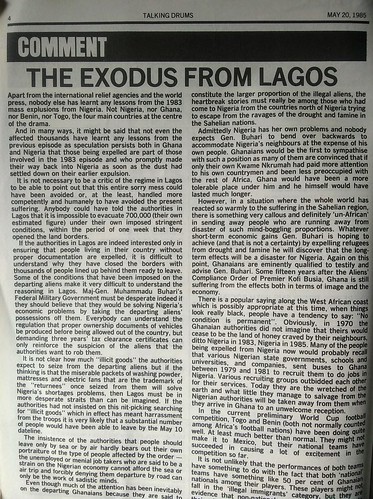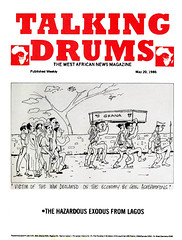The Exodus From Lagos
And in many ways, it might be said that not even the affected thousands have learnt any lessons from the previous episode as speculation persists both in Ghana and Nigeria that those being expelled are part of those involved in the 1983 episode and who promptly made their way back into Nigeria as soon as the dust had settled down on their earlier expulsion.
It is not necessary to be a critic of the regime in Lagos to be able to point out that this entire sorry mess could have been avoided or, at the least, handled more competently and humanely to have avoided the present suffering. Anybody could have told the authorities in Lagos that it is impossible to evacuate 700,000 (their own estimated figure) under their own imposed stringent conditions, within the period of one week that they opened the land borders.
If the authorities in Lagos are indeed interested only in ensuring that people living in their country without proper documentation are expelled, it is difficult to understand why they have closed the borders with thousands of people lined up behind them ready to leave. Some of the conditions that have been imposed on the departing aliens make it very difficult to understand the reasoning in Lagos. Maj-Gen. Muhammadu Buhari's Federal Military Government must be desperate indeed if they should believe that they would be solving Nigeria's economic problems by taking the departing aliens' possessions off them. Everybody can understand the regulation that proper ownership documents of vehicles be produced before being allowed out of the country, but demanding three years' tax clearance certificates can only reinforce the suspicion of the aliens that the authorities want to rob them.
It is not clear how much "illicit goods" the authorities expect to seize from the departing aliens but if the thinking is that the miserable packets of washing powder, mattresses and electric fans that are the trademark of the "returnees" once seized from them will solve Nigeria's shortages problems, then Lagos must be in more desperate straits than can be imagined. If the authorities had not insisted on this nit-picking searching for "illicit goods" which in effect has meant harassment from the troops it is very likely that a substantial number of people would have been able to leave by the May 10 dateline.
The insistence of the authorities that people should leave only by sea or by air hardly bears out their own portraiture of the type of people affected by the order - the unemployed or menial job takers who are said to be a strain on the Nigerian economy cannot afford the sea or air trip and forcibly denying them departure by road can only be the work of sadistic minds. Even though much of the attention has been inevitably on the departing Ghanaians because they are said to constitute the larger proportion of the illegal aliens, the heartbreak stories must really be among those who had come to Nigeria from the countries north of Nigeria trying to escape from the ravages of the drought and famine in the Sahelian nations.
Admittedly Nigeria has her own problems and nobody expects Gen. Buhari to bend over backwards to accommodate Nigeria's neighbours at the expense of his own people. Ghanaians would be the first to sympathise with such a position as many of them are convinced that if only their own Kwame Nkrumah had paid more attention to his own countrymen and been less preoccupied with the rest of Africa, Ghana would have been a more tolerable place under him and he himself would have lasted much longer.
However, in a situation where the whole world has reacted so warmly to the suffering in the Sahelian region, there is something very callous and definitely 'un-African' in sending away people who are running away from disaster of such mind-boggling proportions. Whatever short-term economic gains Gen. Buhari is hoping to achieve (and that is not a certainty) by expelling refugees from drought and famine he will discover that the long- term effects will be a disaster for Nigeria. Again on this point, Ghanaians are eminently qualified to testify and advise Gen. Buhari. Some fifteen years after the Aliens' Compliance Order of Premier Kofi Busia, Ghana is still suffering from the effects both in terms of image and the economy.
There is a popular saying along the West African coast which is possibly appropriate at this time, when things look really black, people have a tendency to say: "No condition is permanent". Obviously, in 1970 the Ghanaian authorities did not imagine that theirs would cease to be the land of honey craved by their neighbours, ditto Nigeria in 1983, Nigeria in 1985. Many of the people being expelled from Nigeria now would probably recall that various Nigerian state governments, schools and universities, and companies, sent buses to Ghana between 1979 and 1981 to recruit them to do jobs in Nigeria. Various recruiting groups outbidded each other for their services. Today they are the wretched of the earth and what little they manage to salvage from the Nigerian authorities will be taken away from them when they arrive in Ghana to an unwelcome reception.
In the current preliminary World Cup football competition, Togo and Benin (both not normally counted among Africa's football nations) have been doing quite well. At least much better than normal. They might not make it to Mexico, but their national teams have succeeded in causing a lot of excitement in the competition so far. It is not unlikely that the performances of both teams have something to do with the fact that both 'national' teams have something like 50 per cent of Ghanaian nationals among their players. These players might not fall in the 'illegal immigrants' category, but they are evidence that non-nationals can make a significant contribution to their adopted countries.

